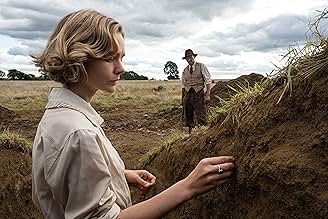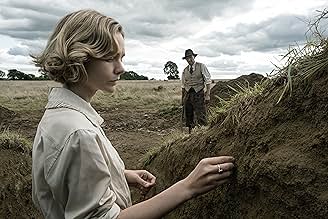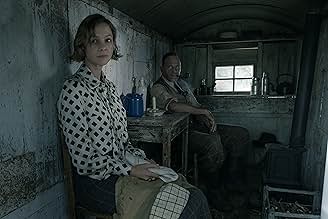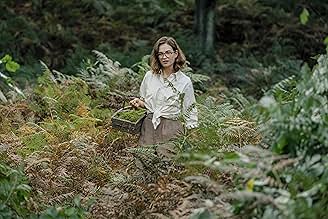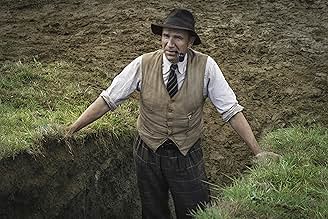VALUTAZIONE IMDb
7,1/10
84.713
LA TUA VALUTAZIONE
Alle soglie della Seconda guerra mondiale, una ricca vedova chiede a un archeologo dilettante di occuparsi degli scavi di alcuni tumuli nella sua proprietà.Alle soglie della Seconda guerra mondiale, una ricca vedova chiede a un archeologo dilettante di occuparsi degli scavi di alcuni tumuli nella sua proprietà.Alle soglie della Seconda guerra mondiale, una ricca vedova chiede a un archeologo dilettante di occuparsi degli scavi di alcuni tumuli nella sua proprietà.
- Nominato ai 5 BAFTA Award
- 3 vittorie e 11 candidature totali
Trama
Lo sapevi?
- QuizReimagines the events of the 1939 excavation of Sutton Hoo near Woodbridge, in Suffolk, England. It is the site of two early medieval cemeteries that date from the 6th to 7th centuries. One cemetery had an undisturbed ship burial with a wealth of Anglo-Saxon artifacts. Most of these objects are now held by the British Museum.
- BlooperEdith's son Robert can be seen wearing an aluminium foil hat early in the movie, Aluminium foil did not surface until after the war, but tin foil had existed since the 19th century.
- Citazioni
Basil Brown: Robert, we all fail. Every day. There are some things we just can't succeed at no matter how hard we try. I know it's not what you want to hear.
- ConnessioniFeatured in Jeremy Vine: Episodio #4.25 (2021)
- Colonne sonoreLa Rejouissance (Allegro)
Written by George Frideric Handel
Public Domain
Arranged by Julian Kershaw
Performed by Alder Valley Brass
Recensione in evidenza
An intriguing little piece of British history, The Dig tells a slow-burning story with understated and genuine drama throughout, turning what could have been a rather dry tale of archaeology into a genuinely gripping character drama. Its historical context takes a little while to become fully relevant, but ultimately, The Dig really proves itself as a captivating watch.
One of the things that I really liked about The Dig was its patience. Never dragging yet never rushing, the film takes its time to build up all of its main strengths, from its characters, their emotional back stories, and the overarching historical context of the outbreak of World War II.
Complete with elegant camerawork, a beautiful score and impressively atmospheric direction that makes it an eye-catching watch from the first few moments, The Dig has enough confidence and depth to keep you engrossed even if its story isn't advancing apace, something that's a lot harder to pull off than you may think.
One of the big reasons that the film's patient pacing and style work so well is because of its understated, genuine drama. With calm yet fully convincing performances across the board, particularly from Ralph Fiennes and Carey Mulligan, this isn't a showy period drama by any means, but eases you into a story about real people, making them the centre of attention far more than the historical significance of the event.
I'm not particularly well-versed in archaeology, and I didn't know about this discovery before watching this film. I think that might be the case for many other people, but the great thing about The Dig is that it's primarily a character-driven drama, and one that uses emotional intrigue to bring you closer to the story at hand and allow you to appreciate its importance.
One element where the film does seem to falter is in its use of the historical backdrop of the lead-up to World War II. Set in the summer months of 1939 before the outbreak of war, there are sporadic references to the coming conflict through the first two acts of the movie, but they don't seem to bear much relevance to this story about an archaeological find.
However, the film slowly begins to unveil how the historical context plays into its characters' personal lives and the fate of the dig itself, with dramatic focus shifting significantly in the final act, but just at the right point that the sudden arrival of the war into everyday life feels just like what it would have been like to experience it first-hand, taking over everything seemingly normal in an instant.
As a result, while the historical backdrop seems almost contrived at first, it really comes good as the film progresses, another demonstration of how the patience of The Dig really plays into its hands throughout.
One of the things that I really liked about The Dig was its patience. Never dragging yet never rushing, the film takes its time to build up all of its main strengths, from its characters, their emotional back stories, and the overarching historical context of the outbreak of World War II.
Complete with elegant camerawork, a beautiful score and impressively atmospheric direction that makes it an eye-catching watch from the first few moments, The Dig has enough confidence and depth to keep you engrossed even if its story isn't advancing apace, something that's a lot harder to pull off than you may think.
One of the big reasons that the film's patient pacing and style work so well is because of its understated, genuine drama. With calm yet fully convincing performances across the board, particularly from Ralph Fiennes and Carey Mulligan, this isn't a showy period drama by any means, but eases you into a story about real people, making them the centre of attention far more than the historical significance of the event.
I'm not particularly well-versed in archaeology, and I didn't know about this discovery before watching this film. I think that might be the case for many other people, but the great thing about The Dig is that it's primarily a character-driven drama, and one that uses emotional intrigue to bring you closer to the story at hand and allow you to appreciate its importance.
One element where the film does seem to falter is in its use of the historical backdrop of the lead-up to World War II. Set in the summer months of 1939 before the outbreak of war, there are sporadic references to the coming conflict through the first two acts of the movie, but they don't seem to bear much relevance to this story about an archaeological find.
However, the film slowly begins to unveil how the historical context plays into its characters' personal lives and the fate of the dig itself, with dramatic focus shifting significantly in the final act, but just at the right point that the sudden arrival of the war into everyday life feels just like what it would have been like to experience it first-hand, taking over everything seemingly normal in an instant.
As a result, while the historical backdrop seems almost contrived at first, it really comes good as the film progresses, another demonstration of how the patience of The Dig really plays into its hands throughout.
- themadmovieman
- 29 gen 2021
- Permalink
I più visti
Accedi per valutare e creare un elenco di titoli salvati per ottenere consigli personalizzati
- How long is The Dig?Powered by Alexa
Dettagli
- Data di uscita
- Paesi di origine
- Sito ufficiale
- Lingua
- Celebre anche come
- The Dig
- Luoghi delle riprese
- Aziende produttrici
- Vedi altri crediti dell’azienda su IMDbPro
Botteghino
- Lordo in tutto il mondo
- 693 USD
- Tempo di esecuzione1 ora 52 minuti
- Colore
- Mix di suoni
- Proporzioni
- 2.00 : 1
Contribuisci a questa pagina
Suggerisci una modifica o aggiungi i contenuti mancanti







